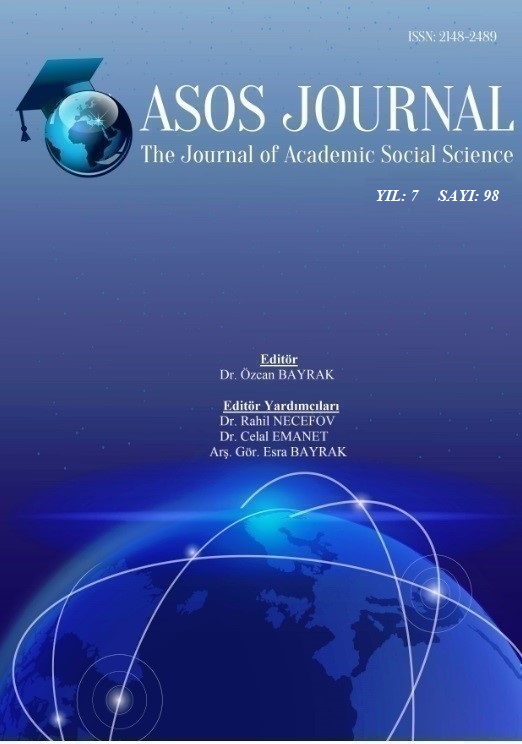Author :
Abstract
Eğitimde en çok araştırılan konulardan biri karakter eğitimidir. Karakter eğitiminin, değerler eğitimi ve ahlâk eğitimi gibi bazı eğitimsel yaklaşımlarla yakın bağlantıları vardır. Bu makale, çok sayıda yayından kısaca alanyazın incelemelerini sunarak karakter ve karakter eğitimi kavramlarına doğrudan değinmektedir. Ayrıca ortak özellikleri açısından ahlâk eğitimi ile değerler eğitiminden bahsetmektedir, zira hepsi birçok bakımdan birbirine benzemektedir. Karakterimiz aslında kim olduğumuzdur ve topluma saygıdeğer ve ahlâklı bir birey yetiştirmek için, etkili karakter eğitimi almak oldukça önemlidir. Bu sebeple, karakter eğitimine maruz kalmak tüm insanlar için öncelikli olmalı ve eğitimciler karakter eğitimini ciddi olarak ele almalıdırlar.
Keywords
Abstract
One of the most researched topics in education has been character education. It has close links with some educational approaches such as values education and moral education. This paper simply touches on the concepts of character and character education by offering literature review shortly from many publications. It also mentions moral education and values education in terms of their common qualities as they all resemble each other in a lot of ways. One’s character is who we are actually and receiving effective character education is highly significant to produce a respectable, moral member for the society. Hence, being exposed to character education must be a priority for all human beings and educators need to consider it seriously.
Keywords
- Arthur, James, (2003), “Character and the Litany of Alarm”, (Ed. James Arthur ), Education with Character: The Moral Economy of Schooling, s. 1 – 12, Routledge, London.
- Berkowitz, Marvin W., (2011), “What Works in Values Education”, International Journal of Educational Research, 50: 153 – 158.
- Cheung, Chau-kiu & Lee, Tak-yan, (2010), “Improving Social Competence through Character Education”, Evaluation and Program Planning, 33: 255 – 263.
- Davidson, Matthew, Khmelkov, Vladimir, Baker, Kyle & Lickona, Thomas, (2011), “Values Education: The Power2Achieve Approach for Building Sustainability and Enduring Impact”, International Journal of Educational Research, 50: 190 – 197.
- Davis, Michael, (2003), “What’s Wrong with Character Education?”, American Journal of Edu- cation, 110 / 1, 32 – 57.
- Ecclestone, Kathryn, (2012), “From Emotional and Psychological Well-Being to Character Education: Challenging Policy Discourses of Behavioural Science and ‘Vulnerability’”, Research Papers in Education, 27 / 4, 463 – 480.
- Elias, Maurice, (2010), “Character Education: Better Students Better People”, The Education Digest, March, 47 – 49.
- Gilead, Tal, (2011), “Countering the Vices: On the Neglected Side of Character Education”, Studies in Philosophy & Education, 30: 271 – 284.
- Gimenez-Camins, Carme & Gallifa, Josep, (2011), “Espinalt’s Concept of Human Will and Character and its Consequences for Moral Education”, Ramon Llull Journal of Applied Ethics, 2: 121-149.
- Komalasari, Kokom, (2012), “The Living Values-Based Contextual Learning to Develop the Students' Character”, Journal of Social Sciences, 8 / 2, 246 – 251.
- Lambert, Mike, (2012), A beginner’s guide to doing your education research Project, Sage Pub- lications Inc., London.
- Langer, Richard; Hall, M. Elizabeth Lewis & McMartin, Jason, (2010), “Human Flourishing: The Context for Character Development in Christian Higher Education”, Christian Higher Education, 9: 336 – 360.
- Lapsley, Daniel & Narvaez, Darcia, (2011), “Moral Criteria and Character Education: A Reply to Welch”, Journal of Moral Education, 40 / 4, 527 – 531.
- Ledford, Alice T., (2011), “Professional Development for Character Education: An Evaluation of Teachers’ Sense of Efficacy for Character Education”, Scholar-Practitioner Quarterly, 5 / 3, 256 – 272.
- Lewis, Paul, (2012), “In Defence of Aristotle on Character: Toward a Synthesis of Recent Psyc- hology, Neuroscience and the Thought of Michael Polanyi”, Journal of Moral Education, 41 / 2, 155 – 170.
- Lin, Wei Neng; Enright, Robert D. & Klatt, John S., (2011), “Forgiveness as Character Educa- tion for Children and Adolescents”, Journal of Moral Education, 40 / 2, 237 – 253.
- Lovat, Terence, (2011), “Values Education and Holistic Learning: Updated Research Perspecti- ves”, International Journal of Educational Research, 50: 148 – 152.
- Lovat Terence & Hawkes Neil, (2013), “Values Education: A Pedagogical Imperative for Stu- dent Wellbeing”, Educational Research International, 2 / 2, 1-6.
- Marshall, Jon. C.; Caldwell, Sarah D. & Foster, Jeanne, (2011), “Moral Education the CHA- RACTERplus Way”, Journal of Moral Education, 40 / 1, 51 – 72.
- Menter, Ian; Elliot, Dely; Hulme, Moira; Lewin, Jon & Lowden, Kevin, (2012), A guide to practitioner research in education, Sage Publications, London.
- Pike, Mark A., (2010), “Christianity and Character Education: Faith in Core Values?”, Journal of Beliefs & Values: Studies in Religion & Education, 31 / 3, 311 – 321.
- Robinson, David. & Jeynes, William H., (2010), “Character Education in Christian Higher Education: A Historical Analysis and Contemporary Challenge (Part II)”, Christian Higher Education, 9 / 4, 316 – 335.
- Robson, Colin, (2000), Real world research: A resource for social scientists and practitioner- researchers, Blackwell, Oxford.
- Stiff-Williams, Helen. R (2010), “Widening the Lens to Teach Character Education Alongside Standards Curriculum”, Clearing House, 83: 115 – 120.
- Winton, Sue, (2010), “Character Development and Critical Democratic Education in Ontario, Canada”, Leadership and Policy in Schools, 9 / 2, 220 – 237.





